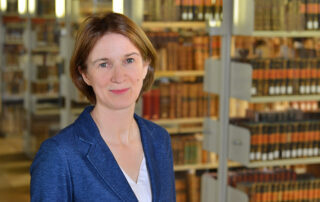After the Enlightenment: Histories, Debates, and Reinterpretations
by Elisabeth Décultot
Few concepts occupy as central a place in contemporary intellectual, political, religious, and cultural debates as the Enlightenment, the Lumières, the Aufklärung, the Illuminismo and their equivalents in other languages. This prominence is hardly surprising in light of their semantic history. In the 18th century, as these notions spread across Europe, they asserted a capacity to shape society and politics in the immediate present (Ferrone/Roche 1999; Portillo Valdés 1999). What is more striking, however, is that these contested terms continue to function as operative categories within academic discourse. This is notable because scholarship—committed to scientific rigour—generally avoids employing terms that are perceived as excessively polemical, and therefore potentially biased, one-sided, or emotionally charged.
Nonetheless, the Enlightenment remains the subject of intense scholarly debate. Even when employed merely as a label for a historical era, the term provokes significant controversy within academic discourse—whether regarding its temporal boundaries (Israel 2001; Pečar/Tricoire 2015), its applicability to periods preceding or following the 18th century, its relationship to other periods such as Classicism, Neoclassicism, and Romanticism, its relevance to non-European contexts, or even its validity for Europe as a whole (Porter/Teich 1981; Godel et al. 2015; Broadie 2001; Martus 2015; Venturi 1969ff; Fillafer 2020; Robertson 2007; D’Aprile 2009; Wolf 2023).
Debates have been particularly vigorous in recent decades over the relationship between the Enlightenment, Eurocentrism, and colonialism. In the context of postcolonial and decolonial studies, scholars have questioned the extent to which the purported universalism of Enlightenment ideals conceals hegemonic or particular interests, and even whether the Enlightenment might be understood as the intellectual vanguard of colonialism (Chakrabarty 2000; Asad 2003; Carey/Festa 2013; Mignolo/Escobar 2010; Mignolo 2011; Dussel 2013; Mbembe 2013; Dhawan 2014; Dhawan 2019).
At the same time, other scholars invoke the Enlightenment in an emphatically affirmative sense. Some call for an “Enlightenment now,” grounded in the conviction that science and reason must continue to improve the world (Pinker 2018). Others propose a “nouvelle philosophie des Lumières” that, among other aims, seeks to rethink humanity’s relationship with nature (Pelluchon 2021), a “third Enlightenment” that abandons the illusions of modernity (Hampe 2018), or an “Enlightenment of the Enlightenment” that confronts its own blind spots (Schmale 2021). Such reappropriations suggest that Enlightenment ideals are gaining renewed political momentum at a moment when the achievements of the historical Enlightenment are perceived to be under threat. Meanwhile, historical scholarship has significantly reshaped our image of the Enlightenment, emphasising its diversity, complexity, and contradictions, while also bringing its limitations into sharper focus.
The current controversies surrounding the concept of the Enlightenment are not new; rather, they have accompanied its use since the 18th century.
Within the framework of the Turin Humanities Programme (THP), we seek to shed light on the origins and trajectories of these debates by examining how the concept of the Enlightenment has been constructed, adapted, contested and (re)appropriated in the 19th, 20th, and 21st centuries—that is, after the historical period conventionally associated with it.
In doing so, the THP aims to contribute to a central yet still underexplored field of research. While a number of studies have addressed interpretations and reappropriations of the Enlightenment since the 18th century (Becker 1994; Reichardt 1998; Dainat/Voßkamp 1999; Ricuperati 2002; Schlott 2012; Ferrone 2017; Lilti 2019; Schmale 2021; Cronk/Décultot 2023; Ferrone/Altopiedi/Grieco 2025), much remains to be investigated.
Given the breadth of the subject, it is not possible—within the scope of this programme—to address it comprehensively in temporal and geographical terms. The research will instead focus particularly on the interplay between national, transnational, and global dimensions of the Enlightenment, privileging both comparative and interdisciplinary perspectives.
The subject potentially encompasses all disciplines within the humanities, including history, art history, cultural history, history of science, philosophy, European and non-European literature, political science, and many other fields.
The project will focus on the diverse issues surrounding the construction of the concept of the Enlightenment during this period, potentially in connection with related notions such as civilisation, colonisation, Eurocentrism, public space, and secularisation (among others). Particular attention will also be given to critiques of the Enlightenment—or of specific currents within it—often grouped under the term ‘Counter-Enlightenment’ (Berlin, 2013).
Possible guiding questions for the research include:
- Which actors, contexts, media, and policies (institutional, cultural, editorial, etc.) contributed to the emergence, between the 19th and 21st centuries, of the concepts of the Enlightenment, Lumières, and Aufklärung as historiographical categories?
- To what extent can this emergence be considered a European phenomenon, or conversely, a non-European one?
- How do the meanings of these concepts vary across different linguistic traditions?
- What roles and definitions does the concept of the Enlightenment assume within postcolonial and decolonial studies?
- Which narratives of the 18th century—conceived as the cradle of the Enlightenment—took shape in the 19th or in the 20th century? Which authors were central to these narratives? What trends can be identified, what periodisations were proposed, and which oppositions or polarities were highlighted?
- How has the definition of the Enlightenment evolved in response to the ideological debates in which the term has been employed?




